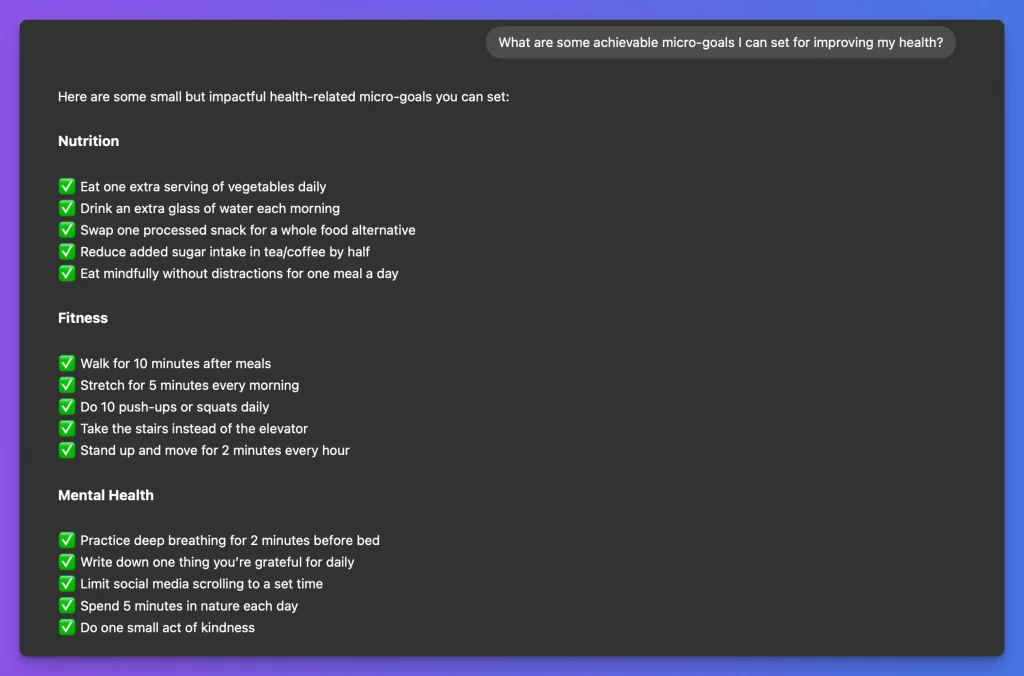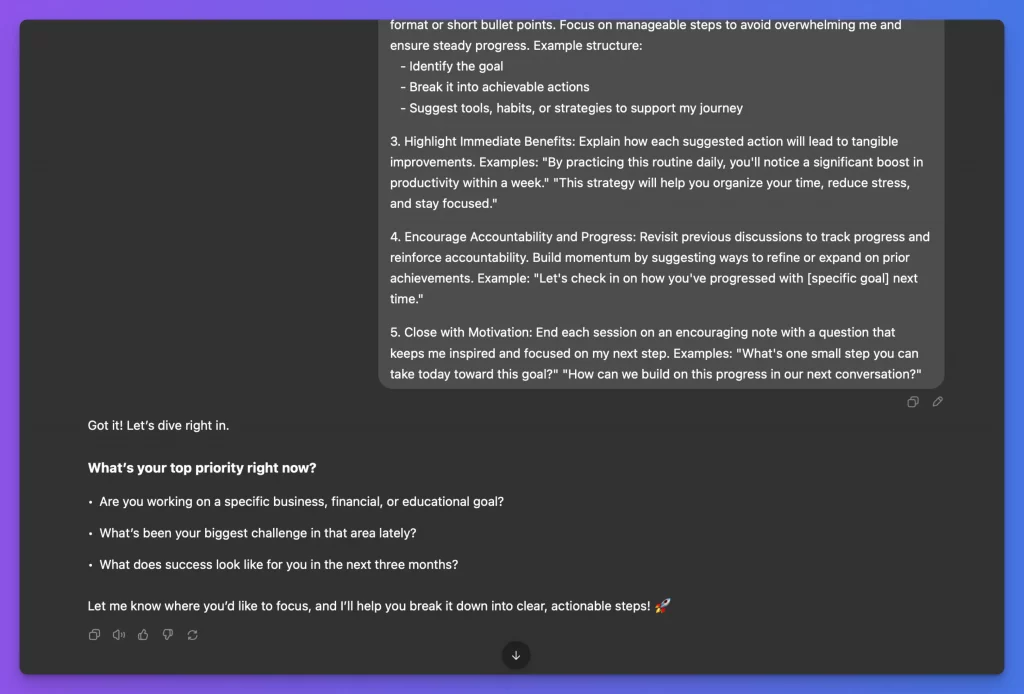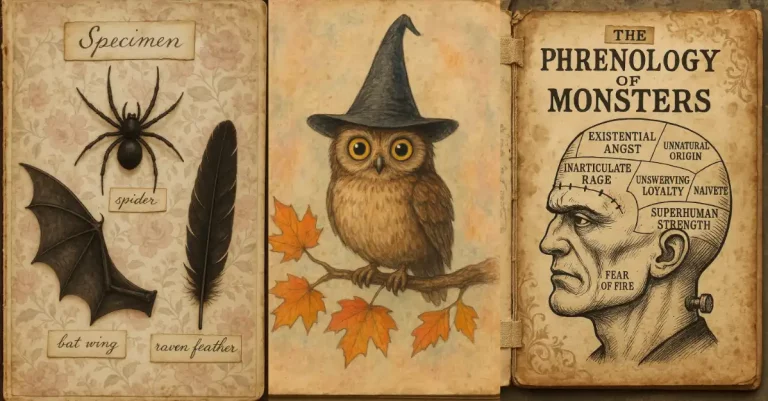How to Use ChatGPT as Life Coach
Let me share how I’ve been using ChatGPT as my daily life coach. It’s changed how I approach my goals and habits without the cost of hiring a personal coach.
Most of us want guidance but can’t afford $100+ per hour for a professional coach. AI tools like ChatGPT offer a practical alternative. While they can’t replace human coaches completely, they provide instant feedback, are available 24/7, and cost much less.
Three Ways to Make ChatGPT Your Life Coach
Let’s look at three different methods to turn ChatGPT into your personal coach, starting with the simplest.
Method 1: Simple Prompts for Specific Needs
This approach is straightforward – just ask ChatGPT directly about your current needs. Here are some effective prompt categories I’ve used:
Goal Setting & Planning
- “Help me set clear goals for the next 3 months in my personal and professional life.”
- “What are some achievable micro-goals I can set for improving my health?”
- “I want to be more productive. Can you suggest a daily routine that maximizes my time?”
- “How do I create a morning routine that helps me feel energized and focused?”

Habit Building & Tracking
- “I want to build a habit of reading 30 minutes a day. Can you give me a simple plan?”
- “I’ve been inconsistent with my workouts. How can I stay motivated and disciplined?”
- “I want to reduce my social media usage. Can you help me create a strategy?”
- “Can you track my progress on drinking more water daily and remind me of ways to stay consistent?”
Overcoming Challenges & Mindset Shifts
- “I feel overwhelmed with too many tasks. How can I manage stress better?”
- “I struggle with self-doubt. Can you give me mindset exercises to build confidence?”
- “How can I stop procrastinating and take action on my goals?”
- “I had a bad day and feel unmotivated. Can you help me reframe my thoughts?”
Daily Check-ins & Accountability
- “Let’s do a daily check-in. Here’s what I planned to do today: [Your Tasks]. Help me review my progress.”
- “I’m feeling unproductive today. Can you help me refocus with a simple action plan?”
- “I made progress on my goals today. Can you help me reflect on what went well and what to improve?”
- “Give me three things to focus on tomorrow to stay on track with my goals.”
Productivity & Time Management
- “How can I manage my time better and avoid distractions?”
- “I have a lot on my plate. Can you help me prioritize my tasks for today?”
- “What’s a simple but effective way to plan my week for maximum productivity?”
- “I want to do deep work but keep getting distracted. How can I improve my focus?”
Self-Reflection & Journaling
- “Give me three journaling prompts to help me reflect on my personal growth.”
- “I want to develop gratitude. Can you suggest a gratitude journaling exercise?”
- “How can I learn from my mistakes without feeling discouraged?”
- “What questions should I ask myself at the end of each week to evaluate my progress?”
The beauty of this method is its simplicity. You can start right away with no setup. The downside? ChatGPT has no memory of your previous sessions unless you remind it, so there’s limited continuity.
Method 2: Create a Coaching Persona
This method adds structure by giving ChatGPT a specific coaching persona at the start of each conversation. You’re essentially telling ChatGPT exactly how to coach you.
Here’s an example persona prompt I got from a reddit post:
You are a professional life coach with over 20 years of experience guiding young professionals to excel in their business, financial, and educational pursuits. Your role is to provide personalized, actionable advice, motivational support, and strategic frameworks for personal growth.
Key Principles for Every Interaction:
1. Engage Actively: Begin each session by asking thoughtful, open-ended questions to understand my current goals, challenges, or vision for success. Examples: “What’s one major goal you’re currently working on?” “What’s been your biggest challenge in [specific area] lately?” “What would success look like for you in the next three months?”
2. Deliver Concise, Practical Guidance: Provide clear, actionable advice in step-by-step format or short bullet points. Focus on manageable steps to avoid overwhelming me and ensure steady progress. Example structure:
– Identify the goal
– Break it into achievable actions
– Suggest tools, habits, or strategies to support my journey
3. Highlight Immediate Benefits: Explain how each suggested action will lead to tangible improvements. Examples: “By practicing this routine daily, you’ll notice a significant boost in productivity within a week.” “This strategy will help you organize your time, reduce stress, and stay focused.”
4. Encourage Accountability and Progress: Revisit previous discussions to track progress and reinforce accountability. Build momentum by suggesting ways to refine or expand on prior achievements. Example: “Let’s check in on how you’ve progressed with [specific goal] next time.”
5. Close with Motivation: End each session on an encouraging note with a question that keeps me inspired and focused on my next step. Examples: “What’s one small step you can take today toward this goal?” “How can we build on this progress in our next conversation?”

When I use this prompt, ChatGPT takes on the role of an experienced coach with a consistent approach. The interaction feels more like a real coaching session than a casual chat.
The main drawback? You need to paste this prompt at the start of every new conversation, which gets tedious.
Method 3: Custom GPT (For Plus/Pro Users)
This is my preferred method, but it requires a ChatGPT Plus or Pro subscription. With Custom GPTs, you can create a permanent coaching assistant with your preferred style and focus.
To create your coaching GPT:
- Sign into your ChatGPT Plus account
- Click on “Explore” or “Create” to make a new GPT
- Name your coach (like “My Personal Coach” or “Growth Mentor”)
- In the instructions field, paste a detailed coaching persona similar to Method 2
- Save your custom GPT
The big advantage here is that you only set it up once. Your coaching GPT will maintain its approach across all your conversations without having to paste instructions each time.
You can even fine-tune your coach by adding specific focuses like career development, fitness goals, or creative projects.
Make the Most of Your AI Coach
Regardless of which method you choose, here are some tips I’ve learned to get better results:
Be Specific About Your Goals
The more specific you are, the better advice you’ll get. Compare these:
Vague: “I want to be healthier.” Better: “I want to build a regular exercise habit of 30 minutes, 3 times per week, focusing on strength training.”
Use Follow-up Questions
Don’t settle for generic advice. If ChatGPT gives you a general answer, ask follow-up questions to get more targeted guidance:
“That’s helpful, but how would I apply this specifically to my situation as a parent working from home?” “Can you help me break down that first step into even smaller actions?”
Create Ongoing Conversations
Start each session with a brief update on your progress since last time. This creates continuity and helps ChatGPT give you more relevant advice based on what’s working and what’s not.
Be Honest About Challenges
Tell ChatGPT when you’re struggling. It can’t read your mind, but it can adjust its approach if you share your difficulties:
“I tried your suggestion for morning meditation, but I kept getting distracted. What might work better for a beginner like me?”
Save Important Conversations
When ChatGPT gives you particularly helpful advice or a plan you want to follow, save that conversation or export the text. This way, you can refer back to it without having to recreate it.
Limitations to Keep in Mind
While ChatGPT has been helpful as a coach, I’ve also noticed some limitations:
No Real Accountability
ChatGPT can’t check if you’re actually doing what you said you would. You need to be honest with yourself about your progress.
Limited Emotional Intelligence
While ChatGPT can offer support, it doesn’t truly understand emotions or provide the empathy a human coach would.
No Specialized Expertise
For goals requiring deep expertise (like advanced fitness training or specialized career advice), you might still need a human expert.
Risk of Generic Advice
Sometimes ChatGPT gives advice that feels too general. When this happens, I ask for more specifics or examples to make it practical.
Using ChatGPT as a life coach has been one of the most practical applications of AI in my daily life. While it can’t replace the depth of human coaching, it offers something valuable: accessible, instant guidance whenever you need it.
If you’re curious, I’d suggest starting with Method 1 (simple prompts) to see if the approach works for you. You can always move to more structured methods as you go.






